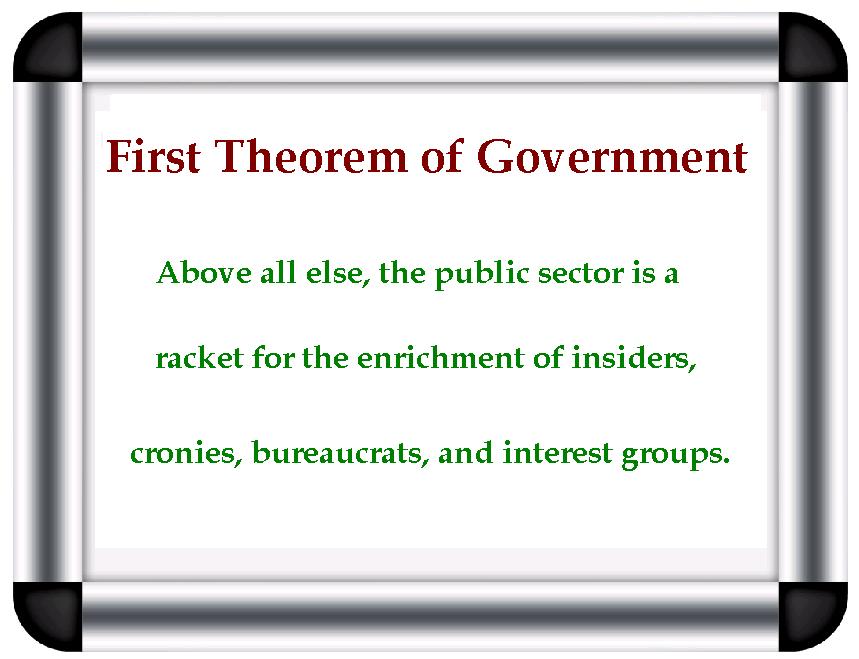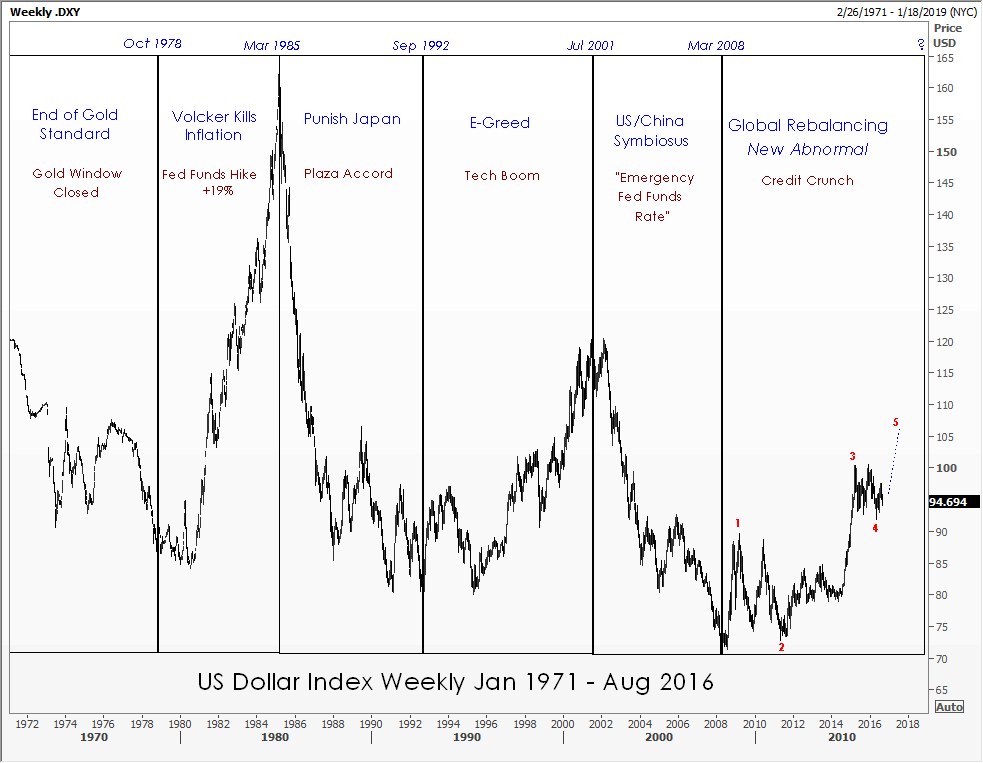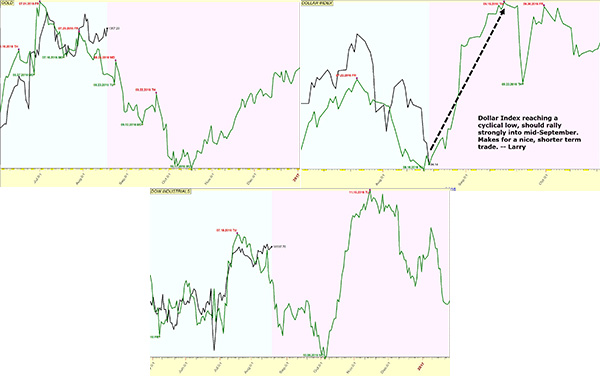Currency
Quotable
“Well, you can just stop and think of what could happen if anybody with a decent system of government got control of that mainland. Good God.… There’d be no power in the world that could even—I mean, you put 800 million Chinese to work under a decent system… and they will be the leaders of the world.”
― Henry Kissinger, On China
Commentary & Analysis
Dollar Retrospective Chart 1971-2016: Next Major Cyclical Driver?
Here’s a retrospective and, hopefully, some perspective on the drivers of the long-term trends in the US dollar index in the era of free-floating after President Nixon closed the gold window on August 15th 1971 and rendering the Brenton Woods system to the dustbin of history. I have added the major macro (blue) events and more specific triggers (maroon) that led to multi-year trend changes; i.e. bull and bear markets, in the dollar.

That might well be the choice. The average family tax bill is up $4200.00 since 2010 according to the recent excellent Fraser Institute Study. Worse, government mismanagement/incompetence revealed in the report will drive them even higher.
Don’t miss Michael’s interview on the “red-hot” Vancouver Real Estate: If It Weren’t So Expensive It Would Be Funny


Emergency Planning

In the financial world…
The U.S. stock market continues to dillydally, with no clear destination.
These are the “dog days” of summer: hot… slow… with little happening. But there are evil portents… and fevers to come.
In Italy, an earthquake has killed 10 people…
Here in France, the gendarmes in Nice have forced a woman on the beach to remove her “burkini.”
Wearing it, she was obeying Muslim law. But the city of Nice… along with 14 other local authorities… requires her to obey their secular law. One law says she must cover up; the other says she must uncover.
And the German government is now advising its citizens to prepare for “emergencies.”
As reported in German newspaper the Frankfurter Allgemeine Zeitung, for the first time since the Cold War, Germans are being urged to stock food, medical supplies and, significantly, cash.
And Deutsche Welle, Germany’s equivalent of the BBC, elaborated:
A wad of cash is another important part of any household’s emergency supplies. There may not be time to rush to a bank, and ATMs won’t work if the power is out.
It’s part of a “civil defense” plan being debated in the German cabinet. The plan says people should prepare for an unspecified event that “could threaten our existence.”
Here at the Diary, we always hope for the best. But it’s not a bad idea to take precautions against the worst.
Note that a mystery hacker group known as the Shadow Brokers, breached the NSA’s elite hacking unit and stole some of the agency’s most powerful “cyber weapons.”
The hacker group is now holding a Bitcoin auction for them. Whoever is the highest bidder will receive a file with the crypto-booty.
If mercenary hackers can break into one of the most secure systems in the world, couldn’t they also breach the electronic money system and wipe out all bank account records?
Our advice: Follow the Germans’ lead. Stock some food and some cash.
Serious Break
Meanwhile, with Elizabeth still laid up after her horse-riding accident, we are growing accustomed to household work.
On Monday, we learned how to cook a mushroom omelet.
Yesterday, we figured out how to operate the washing machine and how to give a sponge bath to an immobile patient.
Later, we hung up the clothes on the line to dry.
Yes, we are learning useful things – things we’d rather not learn at all.
The first thing we learned is how much time it takes to look after an invalid.
There must be millions of older people who know this routine well… calling the doctor… arranging visits with a nurse to give shots… going to the pharmacy to buy drugs… raising the patient… lowering the patient… preparing the meals… cleaning the house…
…whew!
Yesterday, the local doctor came to visit. Dr. Resnier is a colorful man who looks a little like Otto von Bismarck, with a bushy moustache and a belly that hangs over his belt. He drove up in a Jaguar, an unusually expensive car for these parts.
We explained what had happened. He examined the patient. He called the emergency service for a discussion with the doctors there.
“Didn’t they tell you?”
“Tell us what?”
“There’s no wonder she’s in such pain and is fainting. Her back is broken.”
“What?”
“No, it’s not a serious break… and not the kind of break that will cause permanent damage. Just little splinters. They are not really dangerous, but very painful.”
He prescribed more painkillers… charged €33 ($37) for the home visit… and was on his way.
Friends have been helpful, too. Word is getting around that Elizabeth is bedridden. Knowing that she now relies on her husband for everything, they must feel sorry for her.
One neighbor came with hot soup. Another left an entire meal on the table. Our part-time gardener collected some tomatoes and cucumbers from the garden, sliced them up, and sprinkled them with onions.
It was a shock seeing him in the kitchen. He is a rough man, only half-shaven, with hands as hard as nails, and a cigarette permanently dangling from the side of his mouth.
“Damien… I didn’t know you were a chef.”
“Well, when you’re single, you have to know how to cook. Otherwise, you’ll starve.”
Regards,
Bill
Don’t miss reading – Marc Faber Rings the Alarm Bell, Predicts a 50% Near Term Correction in Stocks

It’s been a long, hot, dreary and boring summer for most markets — with some of the tightest trading ranges and lowest volatility seen in decades.
Blame it on whatever, the heat, the elections, diminished investor confidence — it doesn’t matter. All that matters is …
A. We now have some of the tightest-coiled markets, ever, springs ready to explode. And …
B. Short-term cycles now pointing to those springs ready to produce explosive trends in many markets.
Put another way, all that sideways trading of the past several months is finally coming to an end!
And per my recent columns, you should know my forecasts:
For gold and silver, sharply lower into early October.
For the U.S. dollar, sharply higher into the end of the year.
For U.S. and European stock markets, sharply lower into October/November.
For those of you who like my AI charts, here’s an updated montage of gold (silver’s chart is similar), the dollar index and the Dow Industrials.
If it were me, as I noted in last week’s column …
I would hedge any gold and silver holdings you may have with inverse ETFs. For gold I would consider ProShares UltraShort Gold, symbol GLL, which is already popping higher.
For silver I would consider ProShares UltraShort Silver ETF, symbol ZSL, a double leveraged ETF, seeking to deliver twice (2x or 200%) the inverse (or opposite) return of the daily performance of silver bullion in U.S. dollars. Already smoking hot!
 For the Dow Industrials and the S&P 500, I would consider ProShares Short Dow30 ETF (DOG) and the Direxion Daily S&P 500 Bear 1X Shares (SPDN), both unleveraged.
For the Dow Industrials and the S&P 500, I would consider ProShares Short Dow30 ETF (DOG) and the Direxion Daily S&P 500 Bear 1X Shares (SPDN), both unleveraged.
Lastly, I repeat my warning of last week: Everything I study, all major markets and all my major indicators, tell me we’re rapidly approaching a major inflection point in the markets.
Keep in mind, the global economic and geopolitical scene is nasty, and getting worse by the day. In addition to ISIS and domestic uprisings in Europe and the U.S. …
First, the European sovereign debt crisis is getting worse. In fact, on August 11 a bank in a small Bavarian town 50km south of Munich, said starting September 1, it would levy a “custodian charge” of 0.4 percent on deposits above €100,000.
In 2014, Deutsche Skatbank, a small German co-operative bank in the east of the country, introduced negative interest rates for private clients on balances above €500,000.
Germany’s biggest banks, such as Deutsche Bank and Commerzbank, charge negative rates for big corporate and institutional clients and will soon have no choice but to charge retail banking customers as well.
All the result of negative interest rates and hair-brained policies of the ECB.
Second, disinflationary forces are still dominant. Throughout most of Europe, investors are mainly concerned with getting to cash and liquidity, and taking on little to no risk.
That’s disinflationary and it’s having a major impact on all markets, far more than most realize. Europeans who are not investing in our property or stock markets are hoarding cash, not gold.
Long term, though, it is a major force that supports the view for a major new bull market in gold, other precious metals and U.S. stocks.
But not just yet. Pullbacks are needed first. Think of the pullbacks as the forces needed to pull back the string on a bow, creating a compressive force that when released, will send the projectiles launching forward.
Stay tuned and stay safe!
Best wishes,
Larry
…also: Marc Faber Rings the Alarm Bell, Predicts a 50% Near Term Correction in Stocks

 It’s no secret that Felix Zulauf, a member of Barron’s Roundtable, has made timely calls in the past. Just last December on FS Insider, Zulauf called the bottom in gold, which has since risen about 30 percent.
It’s no secret that Felix Zulauf, a member of Barron’s Roundtable, has made timely calls in the past. Just last December on FS Insider, Zulauf called the bottom in gold, which has since risen about 30 percent.
This time on Financial Sense, Zulauf discusses his current outlook and how problems developing in China and Europe may affect both the US and world economy.
….also:














